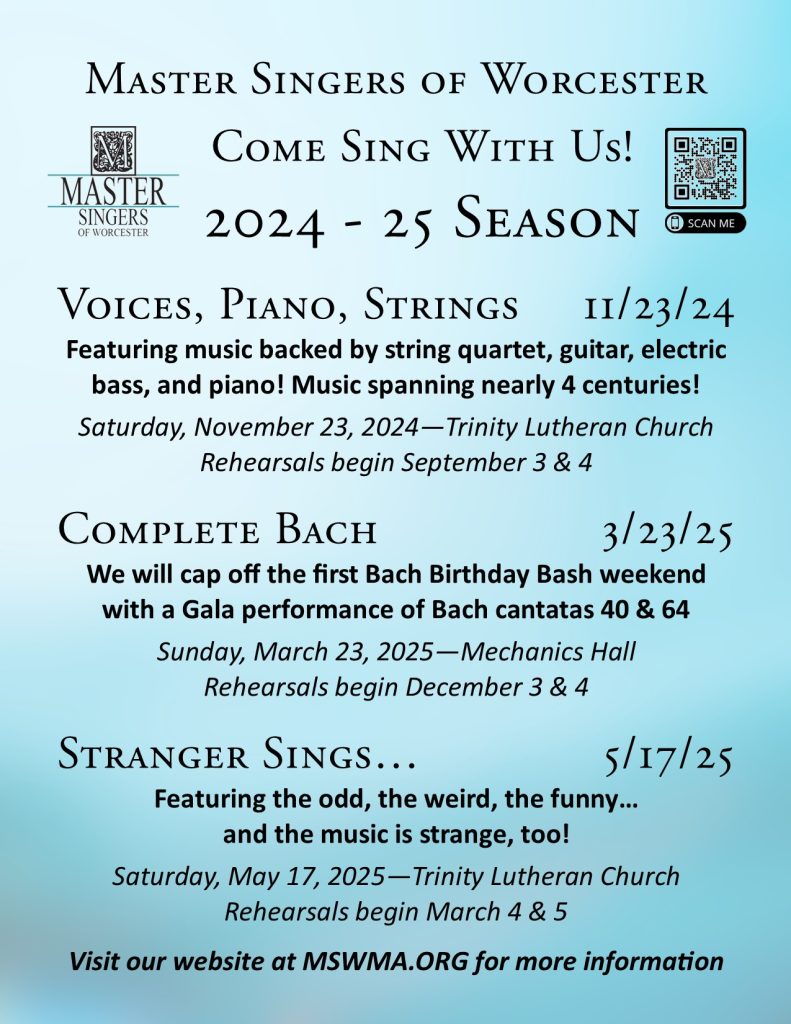Stranger Sings…
7:00 pm Saturday, May 17, 2025
Trinity Lutheran Church, Worcester, MA
Reception and Raffle drawing to follow
presented by the Master Singers of Worcester
Edward Tyler, Artistic Director
Mark Bartlett, pianist
Michael McCarthy, rehearsal accompanist
With guest artists: Agawam High School Chamber Choir
Amanda Johnson, director
Notes, Texts, and Translations
A Few Gentle Admonitions
You just know this needs to be said, or rather, sung.
Greetings! Salutations! Good to have you here! Hello!
We’re tickled and delighted you could join us for our show!
We’ve mastered every measure, we’ve polished every part,
There’s magic in the air, we can barely wait to start!
But wait, before we’re fully underway,
We’ve just a few reminders, s’il vous plait.
If you possess a pager or perhaps a tiny phone
The sound from which could pulverize the largest kidney stone,
We ask you now to render this device completely silent;
For if it should interrupt us, there’s a chance we may get violent.
And if you’re fond of candy that is clad in cellophane,
Unwrap it now or else you’ll be the object of disdain.
Though you may feel you’re making just a tiny little crinkle,
We assure you it’s a noise that could awaken Rip Van Winkle.
And should we croon a favorite tune
That starts you reminiscing
Please know it’s wrong to sing along,
So just sit there and listen!
If little ones are in your entourage, we shout “hooray!”
For now they have a chance to put their manners on display.
We really do love children, but prefer they not run riot.
Just remember, mom and dad, your kids are cuter when they’re quiet.
And if a cold has taken hold,
Don’t stick around and spread it;
Just take a hike and hit the pike,
‘Cause we don’t wanna get it!
We hope we don’t offend you with these things that we request;
It’s simply that we’re eager to perform our very best.
We know we can depend on you for full cooperation;
Kindly wait until we’re through – Remember standards of decorum.
Kindly wait until we’re through – If we hit clunkers, please ignore ‘em!
Kindly wait until we’re through, then you can give us an ovation!
(Just don’t forget to turn your phone off.)
Thank you.
The Song That Goes Like This
Capturing the Tony Award for Best Musical in 2005, Spamalot is the stage adaptation of the 1975 film, Monty Python and The Holy Grail.
Once in every show there comes a song like this,
It starts out soft and low, and ends up with a kiss.
Oh, where is the song that goes like this?
A sentimental song that casts a magic spell.
They all will hum along – we’ll overact as well.
Oh this is the song that goes like this.
Now we can go straight into the middle eight,
A bridge that is too far for me.
I’ll sing it in your face, while we both embrace,
And then, we’ll change the key!
Now we’re into E!
That’s awfully high for me,
But everyone can see we should have stayed in D.
For this is our song that goes like this!
I’m feeling very proud. – You’re singing far too loud.
That’s the way that this song goes. – You’re standing on my toes.
Singing the song that goes like this!
I can’t believe there’s more. – It’s far too long, I’m sure.
That’s the trouble with this song.
It goes on and on and on.
For this is the song that is too long.
We’ll be singing this till dawn. – You’ll wish that you weren’t born.
Let’s stop this refrain, before we go insane.
The song always ends like this!
Down The Witches Road
Written by the composers of Frozen, this was a featured song in the Marvel Universe limited series, “Agatha All Along.”
Seekest thou the road to all that’s foul and fair
Gather sister Fire, Water, Earth, and Air
Darkest hour wake thy power earthly and divine
Burn and brew with coven true and glory shall be thine.
Down Down Down the road – down the Witches’ Road
Circle sown with fate unlock thy hidden gate.
Marching ever forward ‘neath the wooded shrine
I stray not from the path – I hold Death’s hand in mine
Primal night giveth sight – familiar by thy side
If one be gone we carry on – Spirit as our guide.
Down Down Down the road – down the Witches’ Road
Blood and tears and bone – Maiden, Mother, Crone.
The road is wild and wicked winding through the wood
Where all that’s wrong is right and all that’s bad is good
Through many miles of tricks and trials we’ll wander high and low
Tame your fears, a door appears, the time has come to go.
Down Down Down the road – down the Witches’ Road
Follow me, my friend, to glory at the end.
Frim Fram Sauce
Nearly making it to last year’s program about food, The Frim Fram Sauce has been a standard favorite of singers Carmen McRae, Ella Fitzgerald, Louis Armstrong, and Diana Krall.
I don’t want French-fried potatoes, red ripe tomatoes.
I’m never satisfied.
I want the frim fram sauce with the ossenfay, and shafafa on the side.
I don’t want pork chops and bacon, that won’t awaken
My appetite inside.
I want the frim fram sauce with the ossenfay, and shafafa on the side.
You know a girl, she really should eat,
And that girl, she must eat right.
So five will get you ten, I’m gonna do it up right tonight.
I don’t want fish cakes and rye bread, you heard what I said.
Waiter, I want mine fried.
I want the frim fram sauce with the ossenfay, and shafafa on the side.
Hey, Diddle, Diddle
Yes – it’s the old nursery rhyme. And yes – it’s been set to a blues harmony.
Hey, diddle, diddle – The cat and the fiddle,
The cow jumped over the moon.
The little dog laughed to see such a craft,
And the dish ran away with the spoon!
Hey, diddle, diddle – In the middle a little ol’ riddle to titillate!
Hey, diddle, diddle – The cat with the fiddle,
He’s got eyes and ears everywhere.
While dish has been spoonin’ – there’s been other croonin’
All in all, it’s such a tasty affair!
Hey, diddle, diddle – The cat with the fiddle,
He has other news now to report!
It seems that old salad plate – who appeared so second rate,
Has made off with the knife and the fork!
Three Quotes by Mark Twain
- It is better to keep your mouth shut, and let people think you are a fool, than to open it, and remove all doubt.
- If you tell the truth, you don’t have to remember anything.
- My mother had a great deal of trouble with me, but I think she enjoyed it.
Time
You can spend it, when you spend it, then you’re running out of time
You can save it, but to save it is to take a little time
In a minute, when you’re in it, can you feel the passing time?
Is an illusion, there’s confusion, when they tell you now it’s…
Time to get older, time to work and time to waste and there’s no
Time left to hold her, time to tell him how you feel, while there’s still
Time – Three two one, eleven thirty, two AM, then dinner time
Now to kill, I said I will, and still, it flies and flies, oh
Time
Dies Irae
Dies irae, dies illa,
Solvet saeclum in favilla:
Teste David cum Sibylla.
Quantus tremor est futurus,
Quando judex est venturus,
Cuncta stricte discussurus!
Voca me cum benedictis.
Salva me fons pietatis.
Day of wrath, that day
shall dissolve the world into embers,
as David prophesied with the Sibyl.
How great the trembling will be,
when the Judge shall come,
the rigorous investigator of all things!
Call me to be with the blessed.
Save me, fount of pity.
A Mad, Mad, Mad, Mad Madrigal
Written in 2014 by Kirby Shaw, this piece is a parody of the ubiquitous “Fa La La” madrigals.
We sing of a time when rhythm and rhyme coupled up so gaily.
We sing and dance on the green, green grass and the birds do warble daily.
We play our flutes and we tune our harps; it’s merry mirth we’re making.
But the fa-la-las have become quite blah, so here’s a risk we’re taking,
A fine tradition breaking, for sure there’s no mistaking
This mad, mad, mad, mad madrigal !
The Runner
A song about…running? And yet, we think you’ll find this piece mesmerizing, as it depicts the runner moving into a state of “Flow.”
The ground fits his foot perfectly as he runs,
Each breath fits his lungs.
The earth pushes back with its slow spin.
While he crosses the golden field of barley,
It seems to him his body will burst into song.
Please Stay
Commissioned by the Ohio Choral Directors Association College and University Commissioning Consortium, comprised of some twenty-six institutions, Please Stay is a departure from the rest of this concert’s lighter fare. In a divided society, great burdens are placed on everyone, and some of our most valuable members, our young people, are often also the most vulnerable. The text is adapted from messages using the hashtag #IKeptLiving, which are expressions of hope from those battling these burdens and choosing to live on.
No! Don’t go!
Don’t let your worst day be your last.
The storm is strong, but it will pass.
You think you can’t go on another day,
But please stay. Just stay.
Hope is real. Help is real.
You are breath, you are life,
You are beauty, you are light.
Your story is not over.
You are not a burden to anyone.
Ad Astra
Written for the 2020 Kansas All-State Honor Choir, the text is taken from the state motto of Kansas – “To the stars, through struggle.”
Ad astra per aspera
Sursum
To the stars, through struggle
Up!
When you’re tired and troubled and you have lost your way,
Don’t let hard times lead you astray.
Though you may be weary, just know you’re not alone,
For the stars will guide you home.
Movere de inceps
Sine cura, post omnes
Move forward, look upward
Leave all cares behind.
Jabberwocky
First appearing in Through the Looking Glass in 1871, this poem is a satire of the heroic narratives of the time, and was groundbreaking in its use of nonsense words for dramatic impact. Editor’s note – I’ve now wreaked havoc on my spell checker… I hope you’re happy.
‘Twas brillig and the slithy toves, did gyre and gimble in the wabe
All mimsy were the borogoves and the mome raths outgrabe.
“Beware the Jabberwock, my son!
The jaws that bite, the claws that catch!
Beware the Jubjub bird, and shun the frumious Bandersnatch!”
He took his vorpal sword in hand;
Long time the manxome foe he sought.
So rested he by the Tumtum tree, and stood awhile in thought.
And as in uffish thought he stood, the Jabberwock, with eyes of flame
Came whiffling through the tulgey wood and burbled as it came!
One, two!
And through and through the vorpal blade went snickersnack!
He left it dead, and with its head, he went galumphing back.
“And hast thou slain the Jabberwock? Come to my arms, my beamish boy!
O frabjous day! Caloo! Callay!” he chortled in his joy!


